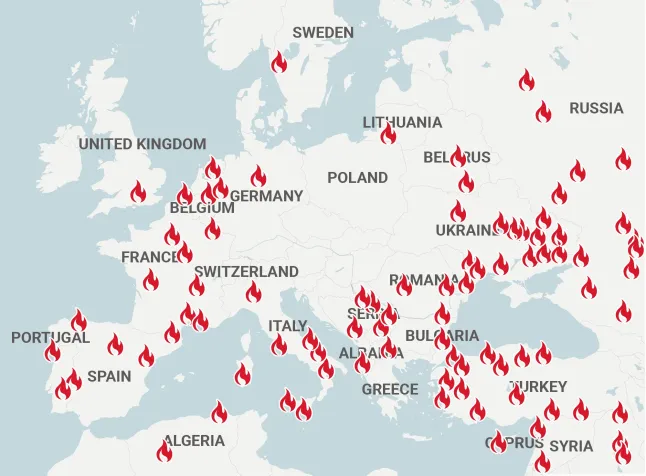In the first seven months of 2025, the European Union has seen a significant rise in wildfire activity, with the area affected by flames doubling compared to the same period last year. This increase is stark: nearly 300,000 hectares have burned so far – an expanse larger than Luxembourg and twice the burned area recorded during January to July 2024. Typically, the area affected by wildfires during this timeframe remains stable or slightly lower than the previous year, making this year’s spike especially alarming.
When looking at individual countries, Bulgaria finds itself in an unsettling third place within the EU for the size of burned land. Cyprus leads with almost 2.5% of its territory consumed by fire, followed by Romania with half a percent, then Bulgaria. Notably, countries often prone to wildfires like Italy and Greece rank behind Bulgaria. According to the European Forest Fire Information System, Bulgaria registered 59 significant fires this year, each affecting over 30 hectares. The real toll may be higher when considering smaller but impactful fires.
Historically, Bulgaria experienced its worst wildfire year in 2007, with a massive swath of forest lost. The previous year, 2024, was also severe, with about 45,000 hectares scorched – roughly the size of Sofia – which accounted for one-third of all forest fires in the EU that year.
Europe relies on a robust firefighting force to combat these disasters, with over 360,000 professional firefighters across member states, making up about 0.18% of total employment. Bulgaria, with approximately 6,500 firefighters, ranks ninth in terms of firefighter proportion relative to population. Croatia tops this list, reflecting its rising struggles with wildfires, followed by Greece. Interestingly, despite being wildfire hotspots, countries such as Spain, France, and Italy have fewer firefighters proportionally, with the Netherlands also ranking surprisingly high. Some nations have yet to provide relevant data.
Budgetary commitment to fire protection averages around half a percent of total spending across the EU. Bulgaria aligns with this average, while Romania allocates the highest share, and Denmark the least. Anticipating increasing wildfire risks, the EU has preemptively mobilized a network of firefighters, planes, and helicopters to assist where necessary. So far, 650 firefighters from 14 member states have been deployed to hotspots like Greece, Portugal, Spain, and France. Additionally, 22 firefighting planes and four helicopters are stationed across ten countries, ready for rapid deployment.
The environmental consequences are equally significant. The rise in burned areas corresponds with a marked increase in carbon dioxide emissions during the first seven months of 2025 compared to last year, further intensifying the ecological impact of these fires.

